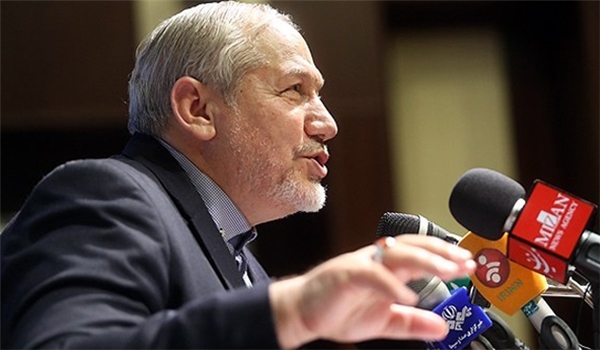
RNA - "Foreign and trans-regional enemies, specially the triangle of the American, Zionist and British devils and their regional servants, cannot pose a serious military threat to us.......as the Iranian nation and the Islamic establishment has grown powerful enough to defend Iran's national interests and security and return any any kind of possible aggression with an unimaginable strike at the enemies of Islam and Iran," General Rahim Safavi told people in the Southwestern city of Ahwaz on Friday.
Yet, Rahim Safavi, who was addressing people at the end of the February 10th rallies marking the 38th anniversary of the victory of the Islamic Revolution, underlined that Tehran would never underestimate its enemies and will always continue to boost its domestic power and capability in all aspects of military, economy and culture.
Millions of Iranians from all walks of life are out in the streets and squares all over the country to express their support for the cause, aspirations and ideals of the Islamic Revolution.
In Tehran, demonstrators will congregate at the Azadi Square, Tehran's main square and the site of major national rallies over the past four decades.
In addition to the annual theme of renewing support for the revolution and Islamic establishment, this year ralliers are also due to express solidarity with the regional nations' revolution against their tyrant rulers as well as their campaign against Takfiri terrorism.
Yet, what has made this year's rallies even more important is the call by the Iranian Supreme Leader, Ayatollah Seyed Ali Khamenei, on people to give a crushing response to the recent threats of US President Donald Trump by staging massive rallies even larger than ever.
Trump claimed on Sunday that Iran “lost respect” for the US in the wake of the 2015 nuclear deal signed between Tehran and the world powers, and that it now feels “emboldened” by the agreement.
He repeated Obama's catch-phrase "all options are still on the table" to imply that the threat of the adoption of military action against Iran is still alive, but a day later the US president took back his word, stressing that he did not mean to threaten Tehran militarily.
Also early Thursday, Trump echoed his national security adviser Michael Flynn’s comments a day earlier that Iran is now formally “on notice” for firing a ballistic missile.
“Iran has been formally PUT ON NOTICE for firing a ballistic missile. Should have been thankful for the terrible deal the U.S. made with them!” he tweeted, without providing any other details.
“Iran was on its last legs and ready to collapse until the U.S. came along and gave it a life-line in the form of the Iran Deal: $150 billion,” he added.
Flynn during a surprise appearance in the White House briefing room last Wednesday criticized Iran for its recent ballistic missile test.
The rallies this year are covered by over 3,250 reporters and photojournalists, including more than 250 from other countries.
Led by the Founder of the Revolution, Imam Khomeini, Iranians confronted the forces of US-proxy Mohammad-Reza Pahlavi in late 1977 to end his oppressive, cruel and autocratic rule over the country.
By December 1978, millions of Iranians would take to the streets in protest against the policies of the Shah on a regular basis.
Grand Ayatollah Ruhollah Khomeini returned from exile to Iran to be received by millions of cheering crowds after the departure of the Shah in mid-January 1979. Two weeks later, the country saw the victory of the Islamic Revolution.
The final collapse of the Shah's regime came on February 10 when the military renounced its loyalty to the Shah and joined the revolutionary forces.
On this day 38 years ago, people took to the streets to celebrate the collapse of the Pahlavi Dynasty and the emergence of the new era.
847/940